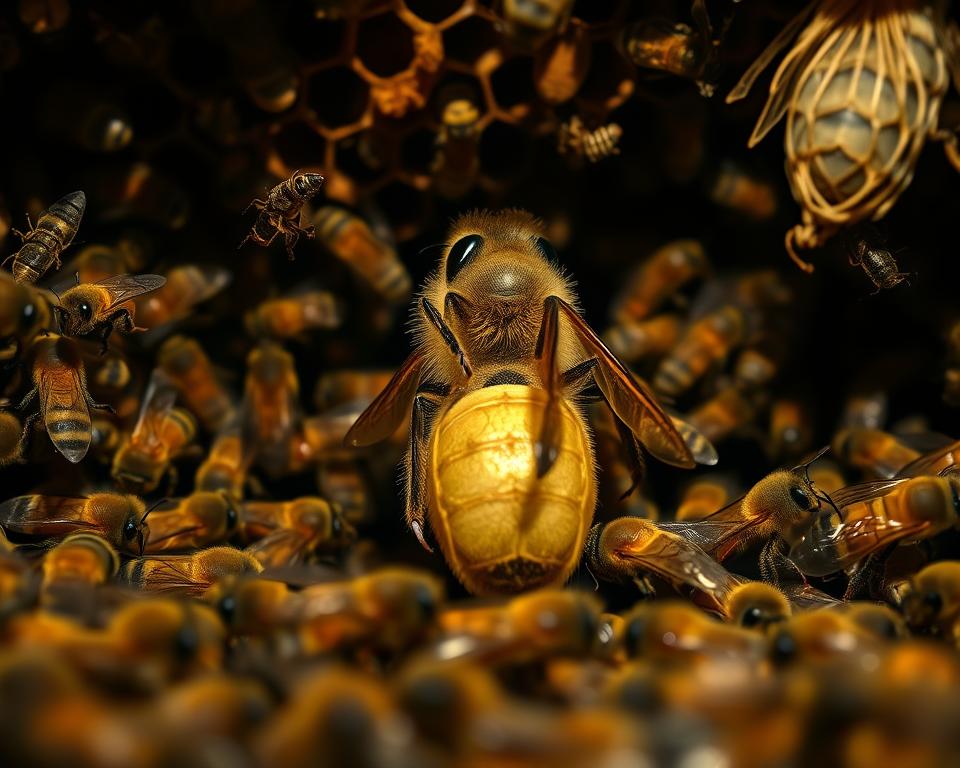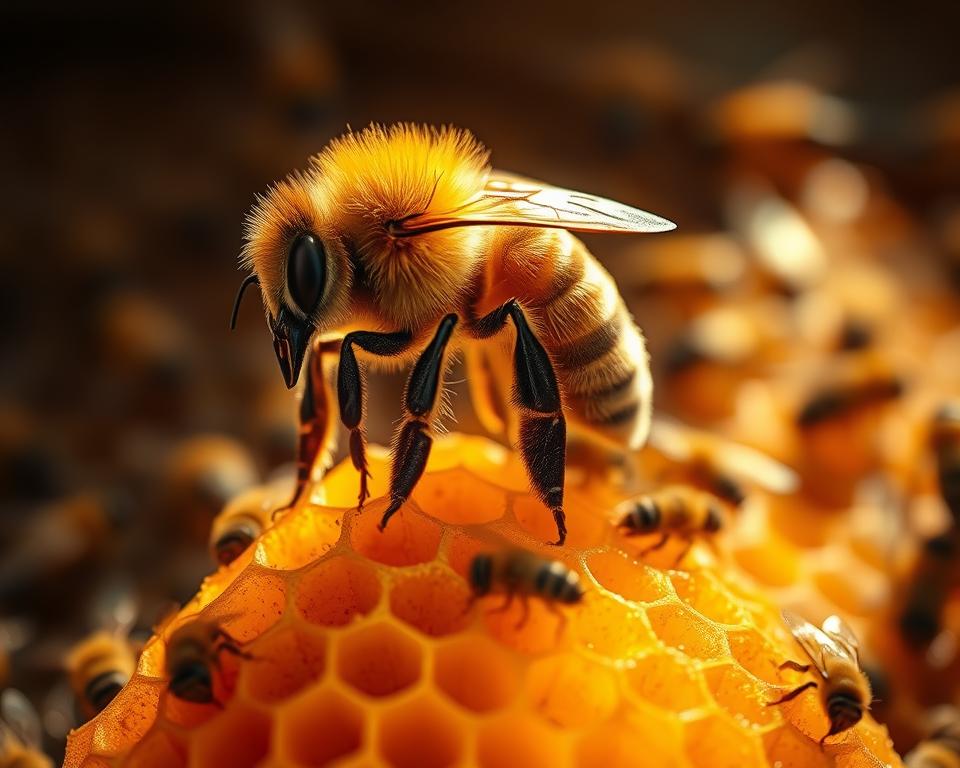A thriving beehive depends a lot on the vitality of its queen. Her longevity directly impacts the colony’s overall productivity. As a beekeeper, knowing what affects your queen’s health is key to a healthy hive.
Did you know a queen’s reproductive health affects her lifespan? Nutrition, disease, and environmental stressors all matter. By using good management, you can help your colony stay strong and healthy all year.
Key Takeaways
- Understanding the importance of queen bee vitality for hive productivity.
- Factors influencing queen longevity, including nutrition and disease.
- Best practices for managing queen health to optimize hive success.
- The role of environmental stressors in queen bee health.
- Strategies for promoting a strong and vibrant colony.
Understanding the Role of the Queen Bee
As a beekeeper, knowing the queen bee’s role is key to a healthy hive. The queen is the biggest bee in the colony. She lays eggs, which keeps the colony alive and growing.
“The queen is the nucleus around which the colony revolves,” and her presence is felt throughout the hive. A healthy queen helps the colony grow by making pheromones. These pheromones control the behavior of worker bees and drones.
Importance of the Queen in the Hive
The queen bee’s role is vital. She’s the only fertile female in the colony. Her pheromones keep the colony in order. Without a healthy queen, the colony can get stressed, leading to less work and even collapse.
How a Healthy Queen Supports Colony Growth
A healthy queen bee helps the colony grow by laying eggs and making pheromones. These pheromones keep the worker bees calm and united. This lets the colony focus on foraging, making honey, and other important tasks. A thriving queen is key to a thriving hive, as I’ve seen in my beekeeping.
Research shows a healthy queen can lay up to 2,000 eggs a day. This is amazing, given her size and the colony’s needs. It shows how important the queen is and how complex the hive’s social life is.
By understanding the queen bee’s role and keeping her healthy, beekeepers can help their colonies thrive. This leads to better bee products, which can improve women’s health and overall well-being.
Factors Affecting Queen Health
Knowing what affects queen bee health is key for a strong hive. As a beekeeper, it’s vital to see how a healthy queen keeps the colony thriving.
Genetics: The Foundation of Longevity
The queen bee’s genes greatly influence her lifespan. Some breeds are more resistant to diseases and pests. Choosing queens with good genes helps keep the colony healthy and strong.
Nutrition: The Queen’s Dietary Needs
A queen bee’s diet is very important for her health and work. Nutrition-rich foods help her lay eggs and grow the colony. Beekeepers should give their queen a variety of nectar and pollen.
Environment: Conditions for Optimal Health
Things like temperature and humidity affect a queen bee’s health a lot. Beekeepers should keep the hive environment stable and good. This means good ventilation and protection from harsh weather.
By knowing and fixing these issues, beekeepers can help their queen stay healthy. This helps the whole colony do well.
Signs of a Healthy Queen Bee
To keep your queen bee healthy, it’s important to know the signs. A healthy queen is key to a strong hive. Recognizing her health signs helps you support her well.
Egg-Laying Patterns
A queen’s egg-laying is a big health indicator. A healthy queen lays eggs regularly and in a pattern. This pattern shows she’s doing well.
Look for these signs of a healthy egg-laying pattern:
- A consistent number of eggs laid daily
- Eggs spread out in the brood nest
- A radial pattern, showing a healthy queen
Behavior and Activity Levels
A healthy queen bee moves around a lot. She looks well-groomed and shiny. Worker bees often groom and feed her.
Here are signs of a healthy queen’s behavior:
- She moves a lot in the hive
- She has a strong presence with worker bees
- She looks well-groomed and shiny
Worker Bee Interactions
How worker bees interact with the queen is important. A healthy queen has many worker bees caring for her. This shows she’s well-looked after.
By spotting these signs, beekeepers can help the queen stay healthy. A healthy queen means a productive and long-lasting hive. Knowing these signs is essential.
Common Threats to Queen Longevity
Knowing what can harm queen bees is key for beekeepers. Queens are vital to the hive’s health. Several factors can harm them, and knowing these can help prevent problems.
Pests and Diseases
Pests and diseases are big threats to queen bees. Varroa mites can weaken the queen and the colony. Diseases like Nosema can also harm the hive a lot. It’s important to watch for these and treat them early.

Environmental Stressors
Things like pesticides and climate change affect queen bees. Pesticides can harm the queen, and climate change can upset the hive’s balance. Using longevity supplements and keeping the environment healthy can help.
Human Impact on Queen Health
Human actions, like beekeeping, can also affect queen health. Poor handling, bad nutrition, and poor hive management can stress the queen. Following best practices and caring for the queen’s needs can improve her health and the hive’s productivity.
By understanding and tackling these threats, beekeepers can help their queen bees stay healthy. This supports a strong and thriving hive.
Best Practices for Queen Bee Management
To keep your queen bee healthy and long-lived, it’s key to manage her well. Good management boosts your queen’s health and helps your colony grow strong.
Regular Health Assessments
Regular health checks are essential to spot queen bee problems early. Look at her physical state, egg-laying, and for signs of illness or pests. This way, you can fix issues quickly and protect your colony.
For more tips on keeping your queen bees healthy, check out 5 tips for maintaining healthy queen. These suggestions offer great advice on caring for your queen.
Creating a Stable Hive Environment
A stable hive is critical for your queen’s health. Keep the hive’s temperature and humidity steady. Also, make sure the colony has enough food and water. A stable home reduces stress on your queen, keeping her healthy and productive.
- Monitor temperature and humidity levels regularly.
- Ensure adequate nutrition for the colony.
- Provide a clean and pest-free environment.
Supporting Queen Replacement
Even with the best care, queens have a short life. It’s important to have a plan for replacing them when needed. This could mean raising new queens or introducing a new one. Being ready ensures your beekeeping success.
“A healthy queen is the backbone of a thriving colony. Ensuring her health and longevity is a top priority for any beekeeper.”
In summary, managing your queen bee well involves regular health checks, a stable home, and planning for replacements. By doing these things, you help your queen bee stay healthy and your colony thrive.
The Impact of Queen Bee Health on Hive Productivity
A healthy queen bee is key to a productive hive. Her longevity and health greatly affect the colony’s performance.
The queen’s health impacts honey production and colony unity. A healthy queen leads to a strong, united colony. This unity is vital for high honey yields.
Relationship Between Queen Health and Honey Production
A healthy queen bee is essential for a productive hive. Her pheromones control the colony’s behavior. A healthy queen fosters a positive, productive environment.
Queen health and honey production are closely linked in several ways:
- Egg-laying capacity: A healthy queen lays more eggs, ensuring a strong workforce for honey production.
- Colony growth: A strong queen supports colony growth, which is necessary for maximizing honey yields.
- Worker bee productivity: The queen’s pheromones influence worker bee behavior, impacting their productivity and honey production.
| Queen Health Indicator | Impact on Honey Production |
|---|---|
| High Egg-Laying Rate | Increased workforce for honey production |
| Strong Pheromone Levels | Improved worker bee productivity |
| Good Overall Health | Robust colony growth and stability |
Role of Queen in Colony Cohesion
The queen bee is vital for colony unity. Her pheromones regulate worker bee behavior. This creates a harmonious, productive colony environment.
By focusing on queen health and longevity, beekeepers can boost hive productivity. Regular health checks and a stable environment are key. They support the queen and the entire colony.
Innovations in Queen Bee Care
New research in genetics, nutrition, and monitoring tools is changing how we care for queen bees. These changes help improve queen bee health and longevity. This, in turn, boosts the health of the whole hive.
Advances in Genetic Research
Genetic research has made big strides in breeding stronger queen bees. Beekeepers now understand how genetics affect queen health. This knowledge helps them choose the right queens for their hives.
Key benefits of genetic research include:
- Improved disease resistance
- Enhanced longevity
- Better adaptation to environmental stressors
For example, studying queen bee genetics has revealed important health and productivity links. Beekeepers can now pick queens that fit their local environment better.
New Nutritional Strategies
Nutrition is key for queen bee health and productivity. New studies aim to meet queens’ dietary needs better. This has led to new ways to feed them.
Some new strategies include:
- Providing nutrient-rich food sources
- Ensuring access to clean water
- Supplementing with essential vitamins and minerals
| Nutritional Element | Benefit to Queen Bees |
|---|---|
| Protein-rich diets | Enhances egg-laying capacity |
| Vitamin supplements | Boosts immune system |
| Clean water access | Maintains overall health |
Tools for Monitoring Queen Health
Advanced tools for tracking queen health are gaining popularity. These tools help beekeepers keep an eye on their queens’ health in real-time. This allows for quick action when needed.
Some tools include:
- Hive scales to monitor weight changes
- Temperature monitors to track hive conditions
- Electronic systems to track queen movement and activity
By using these innovations, beekeepers can give their queen bees the best care. This supports the health and productivity of the whole hive.
Clocking Queen Bee Lifespan
Knowing the average lifespan of your queen bee is key for beekeepers. It affects the hive’s health and how much bee products like honey and beeswax it makes.

Average Lifespan of Queen Bees
A queen bee usually lives for 2 to 3 years. But, some queens may live longer or shorter lives. The queen’s breed can also play a big role in how long she lives.
Factors That Influence Lifespan
Many things can affect a queen bee’s lifespan. These include:
- Genetics: The queen’s genes can make her live longer or shorter.
- Nutrition: Good food is key for the queen’s health and long life.
- Environmental Conditions: Pesticides, diseases, and harsh weather can shorten her life.
- Beekeeper Practices: How the beekeeper manages the hive also matters.
| Factor | Impact on Queen Lifespan |
|---|---|
| Genetics | Predisposes to longevity or short life |
| Nutrition | Supports health and longevity |
| Environmental Conditions | Exposure to stressors can shorten life |
| Beekeeper Practices | Proper management can extend life |
By understanding these factors and creating a healthy environment, beekeepers can help their queen bees live longer. This benefits the hive’s health and productivity.
The Bee Lifecycle and Queen’s Role
The queen bee’s journey from egg to adult is fascinating. It’s key to the colony’s life cycle. The queen’s influence shapes every part of the colony’s growth and work.
From Egg to Adult: The Queen’s Journey
The queen bee starts as an egg, laid by her mother in a special cell. Nutrition is vital for her growth, with royal jelly being essential. This jelly boosts her life span and fertility.
It takes about 16 days for the queen to grow from egg to adult. She goes through three stages: egg, larva, and pupa. During this time, she eats royal jelly and bee bread. These foods give her the proteins and nutrients she needs.
How the Queen Influences Hive Lifecycle
The queen’s presence and pheromones deeply affect the hive’s social structure and work. She controls the behavior of worker bees and drones. This ensures the colony stays balanced and healthy.
For example, her pheromones can tell the colony to swarm or stop new queens from growing. A healthy queen is vital for a productive hive. Genetics, nutrition, and environment all affect her health and the colony’s well-being.
| Factor | Influence on Queen Health | Impact on Hive Productivity |
|---|---|---|
| Genetics | Determines longevity and fertility | Affects colony growth and honey production |
| Nutrition | Impacts development and health | Influences worker bee productivity and brood rearing |
| Environment | Affects stress levels and disease resistance | Impacts overall colony health and resilience |
Understanding the queen’s role helps beekeepers keep their colonies thriving. They can support her health with natural supplements. This improves her nutrition and overall well-being.
Preparing for Possible Queen Problems
Even with great care, queen bees can face issues. It’s key to spot early warning signs. As a beekeeper, being proactive helps your hive’s health and productivity.
Identifying Early Warning Signs
Watching your queen bee’s health means looking for behavior, physical, and performance changes. For example, less egg-laying or disease signs are warning signs. “A healthy queen is the backbone of a thriving colony,” beekeeping experts say.
Some important signs to watch for include:
- Reduced egg-laying patterns
- Visible signs of disease or pests
- Changes in behavior or activity levels
Mitigation Strategies for Hive Management
After spotting issues, having a plan is vital. This means keeping the hive clean, monitoring for pests and diseases, and knowing when to replace a queen. Being ready helps reduce risks and keeps your colony healthy.
Good hive management also includes:
- Regular health assessments
- Creating a stable hive environment
- Supporting queen replacement when necessary
By taking these steps, you help your queen bee stay healthy. This supports the wellness of your hive and helps your queen age healthily.
“The fate of our bees is closely tied to our own; by caring for them, we care for our planet’s health.” This shows why careful beekeeping is so important.
The Future of Queen Bee Health and Longevity
We, as beekeepers, are always looking for ways to keep our queen bees healthy and long-lived. New beekeeping methods and technology are helping a lot. By using precise beekeeping and data analysis, we can better manage our hives. This makes a better home for our queens.
Emerging Trends
Longevity supplements are becoming more popular, and scientists are studying how well they work. These supplements aim to boost the queen’s health. They might help her live longer and make the colony more productive.
Technological Advancements
Technology is changing bee care in big ways. Hive monitoring systems give us important info on queen health. This lets us make smart choices and keep our colonies thriving. By using these new tools, we can help our queen bees live longer and healthier lives.
